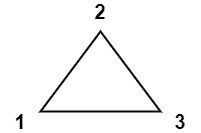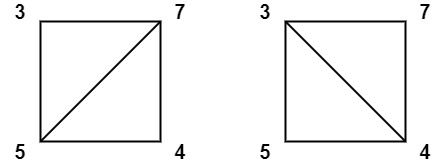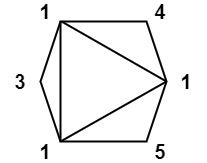Array
Dynamic Programming
Description
You have a convex n-sided polygon where each vertex has an integer value. You are given an integer array values where values[i] is the value of the ith vertex (i.e., clockwise order ).
You will triangulate the polygon into n - 2 triangles. For each triangle, the value of that triangle is the product of the values of its vertices, and the total score of the triangulation is the sum of these values over all n - 2 triangles in the triangulation.
Return the smallest possible total score that you can achieve with some triangulation of the polygon .
Example 1:
Input: values = [1,2,3]
Output: 6
Explanation: The polygon is already triangulated, and the score of the only triangle is 6.
Example 2:
Input: values = [3,7,4,5]
Output: 144
Explanation: There are two triangulations, with possible scores: 3*7*5 + 4*5*7 = 245, or 3*4*5 + 3*4*7 = 144.
The minimum score is 144.
Example 3:
Input: values = [1,3,1,4,1,5]
Output: 13
Explanation: The minimum score triangulation has score 1*1*3 + 1*1*4 + 1*1*5 + 1*1*1 = 13.
Constraints:
n == values.length3 <= n <= 501 <= values[i] <= 100
Solutions
Solution 1
Python3 Java C++ Go TypeScript
1
2
3
4
5
6
7
8
9
10
11
12 class Solution :
def minScoreTriangulation ( self , values : List [ int ]) -> int :
@cache
def dfs ( i : int , j : int ) -> int :
if i + 1 == j :
return 0
return min (
dfs ( i , k ) + dfs ( k , j ) + values [ i ] * values [ k ] * values [ j ]
for k in range ( i + 1 , j )
)
return dfs ( 0 , len ( values ) - 1 )
1
2
3
4
5
6
7
8
9
10
11
12
13
14
15
16
17
18
19
20
21
22
23
24
25
26 class Solution {
private int n ;
private int [] values ;
private Integer [][] f ;
public int minScoreTriangulation ( int [] values ) {
n = values . length ;
this . values = values ;
f = new Integer [ n ][ n ] ;
return dfs ( 0 , n - 1 );
}
private int dfs ( int i , int j ) {
if ( i + 1 == j ) {
return 0 ;
}
if ( f [ i ][ j ] != null ) {
return f [ i ][ j ] ;
}
int ans = 1 << 30 ;
for ( int k = i + 1 ; k < j ; ++ k ) {
ans = Math . min ( ans , dfs ( i , k ) + dfs ( k , j ) + values [ i ] * values [ k ] * values [ j ] );
}
return f [ i ][ j ] = ans ;
}
}
1
2
3
4
5
6
7
8
9
10
11
12
13
14
15
16
17
18
19
20
21
22 class Solution {
public :
int minScoreTriangulation ( vector < int >& values ) {
int n = values . size ();
int f [ n ][ n ];
memset ( f , 0 , sizeof ( f ));
function < int ( int , int ) > dfs = [ & ]( int i , int j ) -> int {
if ( i + 1 == j ) {
return 0 ;
}
if ( f [ i ][ j ]) {
return f [ i ][ j ];
}
int ans = 1 << 30 ;
for ( int k = i + 1 ; k < j ; ++ k ) {
ans = min ( ans , dfs ( i , k ) + dfs ( k , j ) + values [ i ] * values [ k ] * values [ j ]);
}
return f [ i ][ j ] = ans ;
};
return dfs ( 0 , n - 1 );
}
};
1
2
3
4
5
6
7
8
9
10
11
12
13
14
15
16
17
18
19 func minScoreTriangulation ( values [] int ) int {
n := len ( values )
f := [ 50 ][ 50 ] int {}
var dfs func ( int , int ) int
dfs = func ( i , j int ) int {
if i + 1 == j {
return 0
}
if f [ i ][ j ] != 0 {
return f [ i ][ j ]
}
f [ i ][ j ] = 1 << 30
for k := i + 1 ; k < j ; k ++ {
f [ i ][ j ] = min ( f [ i ][ j ], dfs ( i , k ) + dfs ( k , j ) + values [ i ] * values [ k ] * values [ j ])
}
return f [ i ][ j ]
}
return dfs ( 0 , n - 1 )
}
1
2
3
4
5
6
7
8
9
10
11
12
13
14
15
16
17
18
19 function minScoreTriangulation ( values : number []) : number {
const n = values . length ;
const f : number [][] = Array . from ({ length : n }, () => Array . from ({ length : n }, () => 0 ));
const dfs = ( i : number , j : number ) : number => {
if ( i + 1 === j ) {
return 0 ;
}
if ( f [ i ][ j ] > 0 ) {
return f [ i ][ j ];
}
let ans = 1 << 30 ;
for ( let k = i + 1 ; k < j ; ++ k ) {
ans = Math . min ( ans , dfs ( i , k ) + dfs ( k , j ) + values [ i ] * values [ k ] * values [ j ]);
}
f [ i ][ j ] = ans ;
return ans ;
};
return dfs ( 0 , n - 1 );
}
Solution 2
Python3 Java C++ Go TypeScript
class Solution :
def minScoreTriangulation ( self , values : List [ int ]) -> int :
n = len ( values )
f = [[ 0 ] * n for _ in range ( n )]
for i in range ( n - 3 , - 1 , - 1 ):
for j in range ( i + 2 , n ):
f [ i ][ j ] = min (
f [ i ][ k ] + f [ k ][ j ] + values [ i ] * values [ k ] * values [ j ]
for k in range ( i + 1 , j )
)
return f [ 0 ][ - 1 ]
1
2
3
4
5
6
7
8
9
10
11
12
13
14
15
16 class Solution {
public int minScoreTriangulation ( int [] values ) {
int n = values . length ;
int [][] f = new int [ n ][ n ] ;
for ( int i = n - 3 ; i >= 0 ; -- i ) {
for ( int j = i + 2 ; j < n ; ++ j ) {
f [ i ][ j ] = 1 << 30 ;
for ( int k = i + 1 ; k < j ; ++ k ) {
f [ i ][ j ]
= Math . min ( f [ i ][ j ] , f [ i ][ k ] + f [ k ][ j ] + values [ i ] * values [ k ] * values [ j ] );
}
}
}
return f [ 0 ][ n - 1 ] ;
}
}
1
2
3
4
5
6
7
8
9
10
11
12
13
14
15
16
17 class Solution {
public :
int minScoreTriangulation ( vector < int >& values ) {
int n = values . size ();
int f [ n ][ n ];
memset ( f , 0 , sizeof ( f ));
for ( int i = n - 3 ; i >= 0 ; -- i ) {
for ( int j = i + 2 ; j < n ; ++ j ) {
f [ i ][ j ] = 1 << 30 ;
for ( int k = i + 1 ; k < j ; ++ k ) {
f [ i ][ j ] = min ( f [ i ][ j ], f [ i ][ k ] + f [ k ][ j ] + values [ i ] * values [ k ] * values [ j ]);
}
}
}
return f [ 0 ][ n - 1 ];
}
};
1
2
3
4
5
6
7
8
9
10
11
12
13 func minScoreTriangulation ( values [] int ) int {
n := len ( values )
f := [ 50 ][ 50 ] int {}
for i := n - 3 ; i >= 0 ; i -- {
for j := i + 2 ; j < n ; j ++ {
f [ i ][ j ] = 1 << 30
for k := i + 1 ; k < j ; k ++ {
f [ i ][ j ] = min ( f [ i ][ j ], f [ i ][ k ] + f [ k ][ j ] + values [ i ] * values [ k ] * values [ j ])
}
}
}
return f [ 0 ][ n - 1 ]
}
1
2
3
4
5
6
7
8
9
10
11
12
13 function minScoreTriangulation ( values : number []) : number {
const n = values . length ;
const f : number [][] = Array . from ({ length : n }, () => Array . from ({ length : n }, () => 0 ));
for ( let i = n - 3 ; i >= 0 ; -- i ) {
for ( let j = i + 2 ; j < n ; ++ j ) {
f [ i ][ j ] = 1 << 30 ;
for ( let k = i + 1 ; k < j ; ++ k ) {
f [ i ][ j ] = Math . min ( f [ i ][ j ], f [ i ][ k ] + f [ k ][ j ] + values [ i ] * values [ k ] * values [ j ]);
}
}
}
return f [ 0 ][ n - 1 ];
}
Solution 3
Python3 Java C++ Go TypeScript
1
2
3
4
5
6
7
8
9
10
11
12 class Solution :
def minScoreTriangulation ( self , values : List [ int ]) -> int :
n = len ( values )
f = [[ 0 ] * n for _ in range ( n )]
for l in range ( 3 , n + 1 ):
for i in range ( n - l + 1 ):
j = i + l - 1
f [ i ][ j ] = min (
f [ i ][ k ] + f [ k ][ j ] + values [ i ] * values [ k ] * values [ j ]
for k in range ( i + 1 , j )
)
return f [ 0 ][ - 1 ]
1
2
3
4
5
6
7
8
9
10
11
12
13
14
15
16
17 class Solution {
public int minScoreTriangulation ( int [] values ) {
int n = values . length ;
int [][] f = new int [ n ][ n ] ;
for ( int l = 3 ; l <= n ; ++ l ) {
for ( int i = 0 ; i + l - 1 < n ; ++ i ) {
int j = i + l - 1 ;
f [ i ][ j ] = 1 << 30 ;
for ( int k = i + 1 ; k < j ; ++ k ) {
f [ i ][ j ]
= Math . min ( f [ i ][ j ] , f [ i ][ k ] + f [ k ][ j ] + values [ i ] * values [ k ] * values [ j ] );
}
}
}
return f [ 0 ][ n - 1 ] ;
}
}
1
2
3
4
5
6
7
8
9
10
11
12
13
14
15
16
17
18 class Solution {
public :
int minScoreTriangulation ( vector < int >& values ) {
int n = values . size ();
int f [ n ][ n ];
memset ( f , 0 , sizeof ( f ));
for ( int l = 3 ; l <= n ; ++ l ) {
for ( int i = 0 ; i + l - 1 < n ; ++ i ) {
int j = i + l - 1 ;
f [ i ][ j ] = 1 << 30 ;
for ( int k = i + 1 ; k < j ; ++ k ) {
f [ i ][ j ] = min ( f [ i ][ j ], f [ i ][ k ] + f [ k ][ j ] + values [ i ] * values [ k ] * values [ j ]);
}
}
}
return f [ 0 ][ n - 1 ];
}
};
1
2
3
4
5
6
7
8
9
10
11
12
13
14 func minScoreTriangulation ( values [] int ) int {
n := len ( values )
f := [ 50 ][ 50 ] int {}
for l := 3 ; l <= n ; l ++ {
for i := 0 ; i + l - 1 < n ; i ++ {
j := i + l - 1
f [ i ][ j ] = 1 << 30
for k := i + 1 ; k < j ; k ++ {
f [ i ][ j ] = min ( f [ i ][ j ], f [ i ][ k ] + f [ k ][ j ] + values [ i ] * values [ k ] * values [ j ])
}
}
}
return f [ 0 ][ n - 1 ]
}
1
2
3
4
5
6
7
8
9
10
11
12
13
14 function minScoreTriangulation ( values : number []) : number {
const n = values . length ;
const f : number [][] = Array . from ({ length : n }, () => Array . from ({ length : n }, () => 0 ));
for ( let l = 3 ; l <= n ; ++ l ) {
for ( let i = 0 ; i + l - 1 < n ; ++ i ) {
const j = i + l - 1 ;
f [ i ][ j ] = 1 << 30 ;
for ( let k = i + 1 ; k < j ; ++ k ) {
f [ i ][ j ] = Math . min ( f [ i ][ j ], f [ i ][ k ] + f [ k ][ j ] + values [ i ] * values [ k ] * values [ j ]);
}
}
}
return f [ 0 ][ n - 1 ];
}
GitHub





